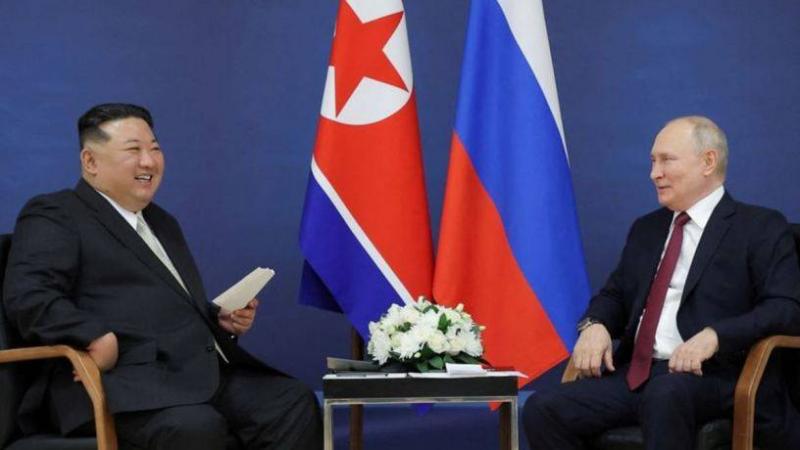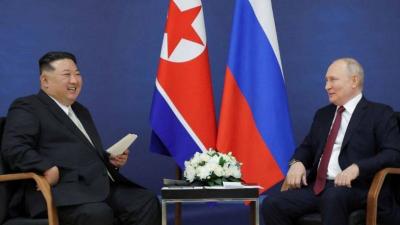The strategic defense agreement signed by Russian leader Vladimir Putin and North Korean leader Kim Jong-un has evoked memories of a similar treaty signed by the two countries during the Cold War, which ceased to exist with the collapse of the Soviet Union. The new treaty, which includes a commitment to mutual defense, was hinted at by Putin's statements, where he pledged a complete restoration of Russia's policy towards North Korea following the Soviet Union's dissolution.
In 1961, North Korea signed a treaty with the Soviet Union that included mutual support commitments in the event of an attack. Observers consider the new agreement as a revival of that treaty, which stipulated mutual defense in case of an attack against either country. Although Putin and Kim did not clarify in the post-agreement conference whether it would require immediate and full military intervention in the event of an attack, as stipulated in the now-defunct 1961 treaty, Putin stated that Russia "does not rule out developing military-technical cooperation" with North Korea under the new agreement, according to the New York Times.
This agreement represents the Kremlin's maximum backing of North Korea, which has significantly supported Russia in its war against Ukraine, increasing concerns for the United States and its allies regarding the extent to which Russia may deepen its support for the sole nation that has conducted a nuclear weapon test this century. Putin stated that the new treaty reflects the two countries' desire not only to bask in their past glories but also to elevate their relations to a new qualitative level. He condemned U.S. efforts to expand military infrastructure in the region and conduct exercises with South Korea and Japan, asserting that "Pyongyang has the right to take reasonable actions to strengthen its defense capability, ensure national security, and protect sovereignty."
The North Korean leader described the treaty as the "strongest agreement." It is likely that the commitment to mutual assistance will heighten concerns in Washington and among its allies, particularly South Korea, as it not only provides more support for Russia's war in Ukraine but also undermines efforts to curb North Korea's nuclear and missile programs.
**Previous Agreements**
The friendship treaty signed between the two countries in 1961 between Pyongyang and Moscow required both countries to "provide military assistance and other forms of aid immediately," by all available means, if either found itself at war. However, it ceased to exist with the end of the Soviet Union. The agreement signed during Putin's last visit to North Korea in 2000 lacked a clause for automatic military intervention; it merely called for mutual "communication" in case of a security emergency and did not stipulate military assistance.
While North Korea referred to Putin as "a dear friend," he is viewed as the first leader of a major country to visit North Korea since the COVID-19 pandemic, underscoring the special significance of this visit. Despite Putin thanking the North Korean leader for the consistent support of Russian policy, including regarding Ukraine, both countries have denied U.S.-led Western claims that Moscow is receiving shipments of weapons, including artillery shells and missiles from North Korea since the onset of the recent Ukrainian war. Conversely, Kim is seeking Russian assistance to alleviate his country's oil shortages, improve weapon systems, and undermine U.S. attempts to choke its economy through international sanctions.
**Nuclear Tests**
The new commitment between the two countries is viewed by observers as a threat to U.S. efforts to curb North Korea’s nuclear testing. Previously, Russia joined the United States in imposing UN sanctions on Pyongyang due to its nuclear programs, but it seems those days are over. Former U.S. diplomat Michael McFaul stated, "I don't think (Putin) will sign that again... I think he has decided that we are the enemy, and the international order anchored by the U.S. is over, and he wants to see it destroyed," according to the Gulf website.




